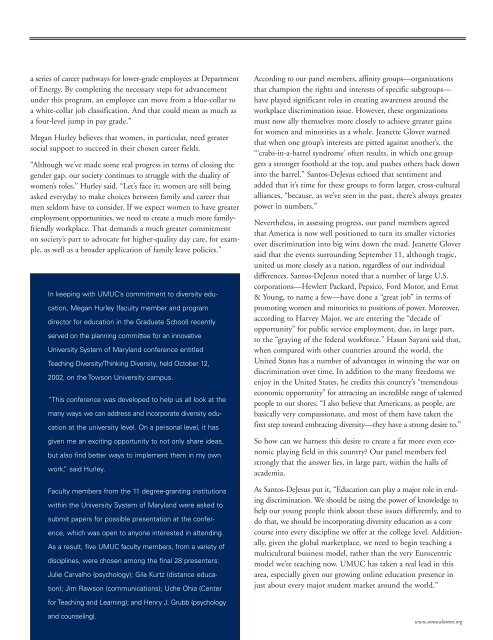You also want an ePaper? Increase the reach of your titles
YUMPU automatically turns print PDFs into web optimized ePapers that Google loves.
a series of career pathways for lower-grade employees at Department<br />
of Energy. By completing <strong>the</strong> necessary steps for advancement<br />
under this program, an employee can move from a blue-collar to<br />
a white-collar job classification. And that could mean as much as<br />
a four-level jump in pay grade.”<br />
Megan Hurley believes that women, in particular, need greater<br />
social support to succeed in <strong>the</strong>ir chosen career fields.<br />
“Although we’ve made some real progress in terms of closing <strong>the</strong><br />
gender gap, our society continues to struggle with <strong>the</strong> duality of<br />
women’s roles,” Hurley said. “Let’s face it; women are still being<br />
asked everyday to make choices between family and career that<br />
men seldom have to consider. If we expect women to have greater<br />
employment opportunities, we need to create a much more familyfriendly<br />
workplace. That demands a much greater commitment<br />
on society’s part to advocate for higher-quality day care, for example,<br />
as well as a broader application of family leave policies.”<br />
In keeping with <strong>UMUC</strong>’s commitment to diversity edu-<br />
cation, Megan Hurley (faculty member and program<br />
director for education in <strong>the</strong> Graduate School) recently<br />
served on <strong>the</strong> planning committee for an innovative<br />
University System of Maryland conference entitled<br />
Teaching Diversity/Thinking Diversity, held October 12,<br />
2002, on <strong>the</strong> Towson University campus.<br />
“This conference was developed to help us all look at <strong>the</strong><br />
many ways we can address and incorporate diversity edu-<br />
cation at <strong>the</strong> university level. On a personal level, it has<br />
given me an exciting opportunity to not only share ideas,<br />
but also find better ways to implement <strong>the</strong>m in my own<br />
work,” said Hurley.<br />
Faculty members from <strong>the</strong> 11 degree-granting institutions<br />
within <strong>the</strong> University System of Maryland were asked to<br />
submit papers for possible presentation at <strong>the</strong> confer-<br />
ence, which was open to anyone interested in attending.<br />
As a result, five <strong>UMUC</strong> faculty members, from a variety of<br />
disciplines, were chosen among <strong>the</strong> final 28 presenters:<br />
Julie Carvalho (psychology); Gila Kurtz (distance educa-<br />
tion); Jim Rawson (communications); Uche Ohia (Center<br />
for Teaching and Learning); and Henry J. Grubb (psychology<br />
and counseling).<br />
According to our panel members, affinity groups—organizations<br />
that champion <strong>the</strong> rights and interests of specific subgroups—<br />
have played significant roles in creating awareness around <strong>the</strong><br />
workplace discrimination issue. However, <strong>the</strong>se organizations<br />
must now ally <strong>the</strong>mselves more closely to achieve greater gains<br />
for women and minorities as a whole. Jeanette Glover warned<br />
that when one group’s interests are pitted against ano<strong>the</strong>r’s, <strong>the</strong><br />
“‘crabs-in-a-barrel syndrome’ often results, in which one group<br />
gets a stronger foothold at <strong>the</strong> top, and pushes o<strong>the</strong>rs back down<br />
into <strong>the</strong> barrel.” Santos-DeJesus echoed that sentiment and<br />
added that it’s time for <strong>the</strong>se groups to form larger, cross-cultural<br />
alliances, “because, as we’ve seen in <strong>the</strong> past, <strong>the</strong>re’s always greater<br />
power in numbers.”<br />
Never<strong>the</strong>less, in assessing progress, our panel members agreed<br />
that America is now well positioned to turn its smaller victories<br />
over discrimination into big wins down <strong>the</strong> road. Jeanette Glover<br />
said that <strong>the</strong> events surrounding September 11, although tragic,<br />
united us more closely as a nation, regardless of our individual<br />
differences. Santos-DeJesus noted that a number of large U.S.<br />
corporations—Hewlett Packard, Pepsico, Ford Motor, and Ernst<br />
& Young, to name a few—have done a “great job” in terms of<br />
promoting women and minorities to positions of power. Moreover,<br />
according to Harvey Major, we are entering <strong>the</strong> “decade of<br />
opportunity” for public service employment, due, in large part,<br />
to <strong>the</strong> “graying of <strong>the</strong> federal workforce.” Hasan Sayani said that,<br />
when compared with o<strong>the</strong>r countries around <strong>the</strong> world, <strong>the</strong><br />
United States has a number of advantages in winning <strong>the</strong> war on<br />
discrimination over time. In addition to <strong>the</strong> many freedoms we<br />
enjoy in <strong>the</strong> United States, he credits this country’s “tremendous<br />
economic opportunity” for attracting an incredible range of talented<br />
people to our shores. “I also believe that Americans, as people, are<br />
basically very compassionate, and most of <strong>the</strong>m have taken <strong>the</strong><br />
first step toward embracing diversity—<strong>the</strong>y have a strong desire to.”<br />
So how can we harness this desire to create a far more even economic<br />
playing field in this country? Our panel members feel<br />
strongly that <strong>the</strong> answer lies, in large part, within <strong>the</strong> halls of<br />
academia.<br />
As Santos-DeJesus put it, “Education can play a major role in ending<br />
discrimination. We should be using <strong>the</strong> power of knowledge to<br />
help our young people think about <strong>the</strong>se issues differently, and to<br />
do that, we should be incorporating diversity education as a core<br />
course into every discipline we offer at <strong>the</strong> college level. Additionally,<br />
given <strong>the</strong> global marketplace, we need to begin teaching a<br />
multicultural business model, ra<strong>the</strong>r than <strong>the</strong> very Eurocentric<br />
model we’re teaching now. <strong>UMUC</strong> has taken a real lead in this<br />
area, especially given our growing online education presence in<br />
just about every major student market around <strong>the</strong> world.”<br />
www.umucalumni.org

















